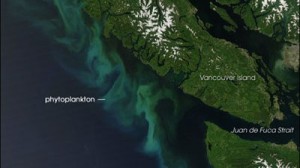By Pennell Paugh
 We recently wrote that phytoplankton, which is the basis for the vast majority of oceanic and some freshwater food chains, is on the decline due to global warming of the planet. However, a new article published in Geophysical Research Letters, reports that the recent eruption of a volcano in the on the remote island of Kasatochi, part of Alaska’s Aleutian Islands chain, spewed iron-laden ash over a large swath of the North Pacific causing an “ocean productivity event of unprecedented magnitude” — the largest phytoplankton bloom detected in the region since ocean surface measurements by satellite began in 1997.
We recently wrote that phytoplankton, which is the basis for the vast majority of oceanic and some freshwater food chains, is on the decline due to global warming of the planet. However, a new article published in Geophysical Research Letters, reports that the recent eruption of a volcano in the on the remote island of Kasatochi, part of Alaska’s Aleutian Islands chain, spewed iron-laden ash over a large swath of the North Pacific causing an “ocean productivity event of unprecedented magnitude” — the largest phytoplankton bloom detected in the region since ocean surface measurements by satellite began in 1997.
While you would expect that because plankton consumes CO2 and gives the planet much needed oxygen, that the plankton bloom must have lowered the amount of CO2 globally. However, the researchers found that the bloom had only a modest impact on CO2 levels.
The study also dashed the hopes of some who hope to fertilize the oceans with iron to encourage phytoplankton growth. In just 25 hours, the volcano spewed as much as a quarter of a cubic kilometer of material, with gas and ash clouds spreading across Canada and the continental United States. Then a storm swept volcanic ash out to sea, sprinkling iron-rich particles across a 1,000-kilometer stretch of the Pacific. Such iron fertilization would be hard to reproduce.
References
http://www.sciencedaily.com/releases/2010/10/101006094059.htm
http://www.theatlantic.com/business/archive/2010/07/phytoplankton-panic/60664/
http://www.triumf.info/public/news/newsletter/V3N1/APPLIED.htm

Comments are closed.